
Expert Verified, Online, Free.

DRAG DROP -
You have 100 chatbots that each has its own Language Understanding model.
Frequently, you must add the same phrases to each model.
You need to programmatically update the Language Understanding models to include the new phrases.
How should you complete the code? To answer, drag the appropriate values to the correct targets. Each value may be used once, more than once, or not at all.
You may need to drag the split bar between panes or scroll to view content.
NOTE: Each correct selection is worth one point.
Select and Place:
Correct Answer:

Box 1: AddPhraseListAsync -
Example: Add phraselist feature -
var phraselistId = await client.Features.AddPhraseListAsync(appId, versionId, new PhraselistCreateObject
{
EnabledForAllModels = false,
IsExchangeable = true,
Name = "QuantityPhraselist",
Phrases = "few,more,extra"
});
Box 2: PhraselistCreateObject -
Reference:
https://docs.microsoft.com/en-us/azure/cognitive-services/luis/client-libraries-rest-api
DRAG DROP -
You plan to use a Language Understanding application named app1 that is deployed to a container.
App1 was developed by using a Language Understanding authoring resource named lu1.
App1 has the versions shown in the following table.
You need to create a container that uses the latest deployable version of app1.
Which three actions should you perform in sequence? To answer, move the appropriate actions from the list of actions to the answer area and arrange them in the correct order.
Select and Place: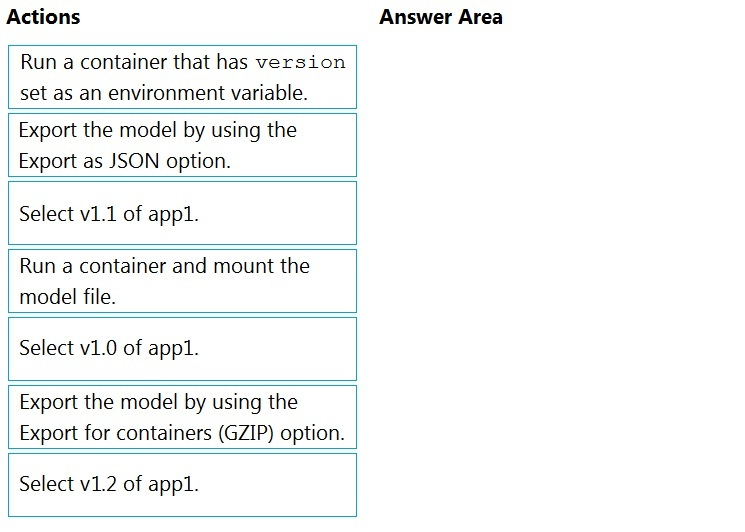
Correct Answer:
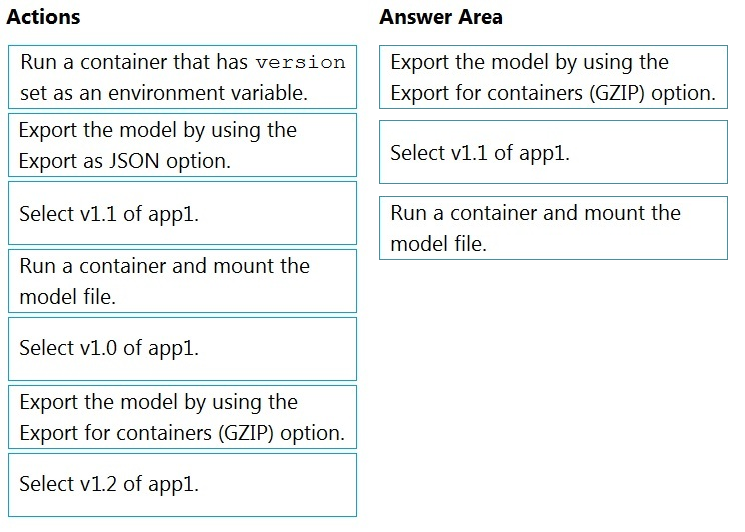
Step 1: Export the model using the Export for containers (GZIP) option.
Export versioned app's package from LUIS portal
The versioned app's package is available from the Versions list page.
1. Sign on to the LUIS portal.
2. Select the app in the list.
3. Select Manage in the app's navigation bar.
4. Select Versions in the left navigation bar.
5. Select the checkbox to the left of the version name in the list.
6. Select the Export item from the contextual toolbar above the list.
7. Select Export for container (GZIP).
8. The package is downloaded from the browser.
Step 2: Select v1.1 of app1.
A trained or published app packaged as a mounted input to the container with its associated App ID.
Step 3: Run a contain and mount the model file.
Run the container, with the required input mount and billing settings.
Reference:
https://docs.microsoft.com/en-us/azure/cognitive-services/luis/luis-container-howto
You need to build a chatbot that meets the following requirements:
✑ Supports chit-chat, knowledge base, and multilingual models
✑ Performs sentiment analysis on user messages
✑ Selects the best language model automatically
What should you integrate into the chatbot?
Correct Answer:
C
🗳️
Language Understanding: An AI service that allows users to interact with your applications, bots, and IoT devices by using natural language.
QnA Maker is a cloud-based Natural Language Processing (NLP) service that allows you to create a natural conversational layer over your data. It is used to find the most appropriate answer for any input from your custom knowledge base (KB) of information.
Text Analytics: Mine insights in unstructured text using natural language processing (NLP)ג€"no machine learning expertise required. Gain a deeper understanding of customer opinions with sentiment analysis. The Language Detection feature of the Azure Text Analytics REST API evaluates text input
Incorrect Answers:
A, B, D: Dispatch uses sample utterances for each of your bot's different tasks (LUIS, QnA Maker, or custom), and builds a model that can be used to properly route your user's request to the right task, even across multiple bots.
Reference:
https://azure.microsoft.com/en-us/services/cognitive-services/text-analytics/ https://docs.microsoft.com/en-us/azure/cognitive-services/qnamaker/overview/overview
Your company wants to reduce how long it takes for employees to log receipts in expense reports. All the receipts are in English.
You need to extract top-level information from the receipts, such as the vendor and the transaction total. The solution must minimize development effort.
Which Azure service should you use?
Correct Answer:
C
🗳️
Azure Form Recognizer is a cognitive service that lets you build automated data processing software using machine learning technology. Identify and extract text, key/value pairs, selection marks, tables, and structure from your documentsג€"the service outputs structured data that includes the relationships in the original file, bounding boxes, confidence and more.
Form Recognizer is composed of custom document processing models, prebuilt models for invoices, receipts, IDs and business cards, and the layout model.
Reference:
https://docs.microsoft.com/en-us/azure/cognitive-services/form-recognizer
HOTSPOT -
You need to create a new resource that will be used to perform sentiment analysis and optical character recognition (OCR). The solution must meet the following requirements:
✑ Use a single key and endpoint to access multiple services.
✑ Consolidate billing for future services that you might use.
✑ Support the use of Computer Vision in the future.
How should you complete the HTTP request to create the new resource? To answer, select the appropriate options in the answer area.
NOTE: Each correct selection is worth one point.
Hot Area: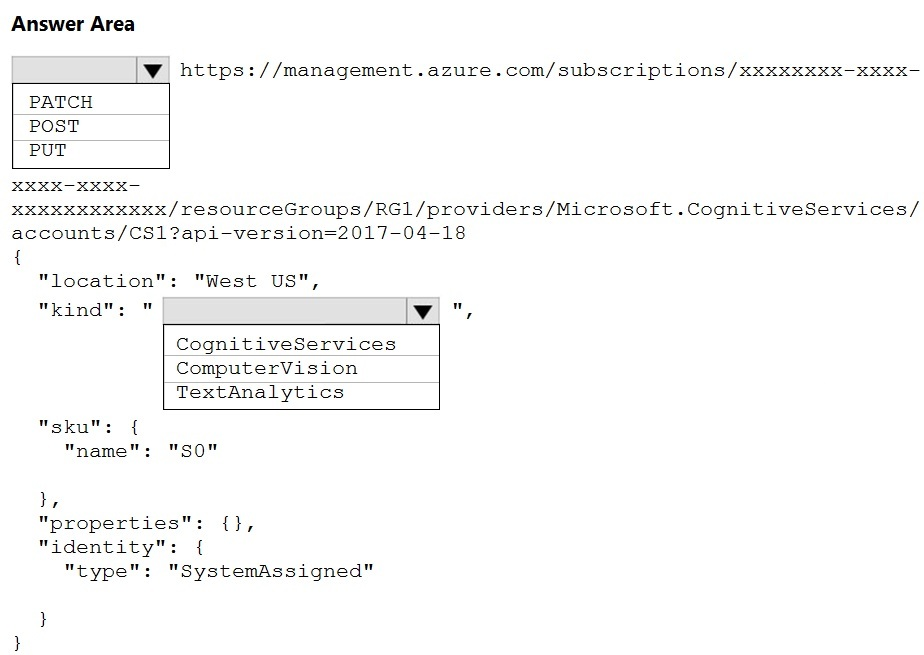
Correct Answer:
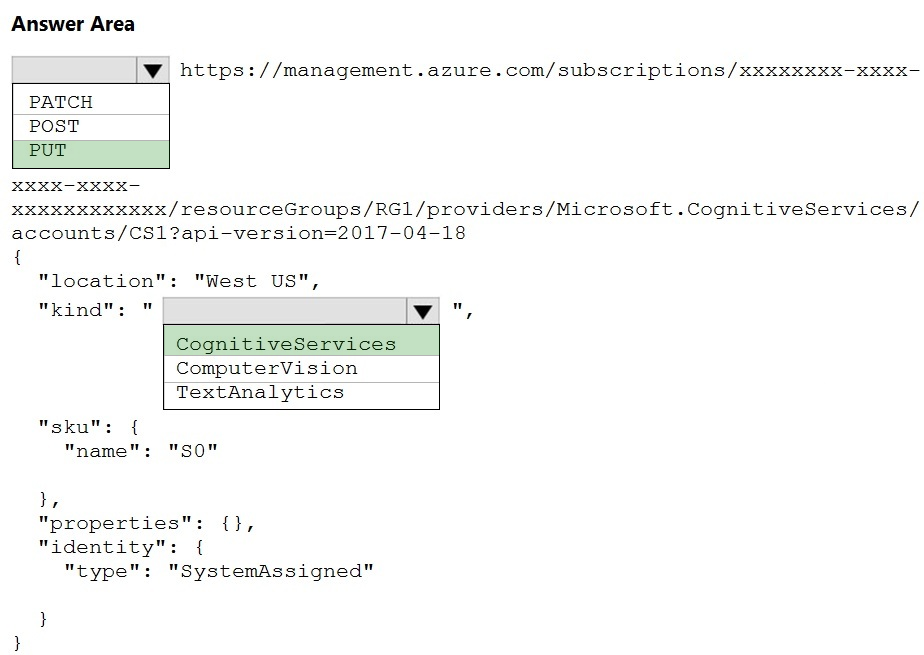
Box 1: PUT -
Sample Request: PUT https://management.azure.com/subscriptions/00000000-0000-0000-0000-000000000000/resourceGroups/test-rg/providers/
Microsoft.DeviceUpdate/accounts/contoso?api-version=2020-03-01-preview
Incorrect Answers:
PATCH is for updates.
Box 2: CognitiveServices -
Microsoft Azure Cognitive Services provide us to use its pre-trained models for various Business Problems related to Machine Learning.
List of Different Services are:
✑ Decision
✑ Language (includes sentiment analysis)
✑ Speech
✑ Vision (includes OCR)
✑ Web Search
Reference:
https://docs.microsoft.com/en-us/rest/api/deviceupdate/resourcemanager/accounts/create https://www.analyticsvidhya.com/blog/2020/12/microsoft-azure-cognitive-services-api-for-ai-development/
You are developing a new sales system that will process the video and text from a public-facing website.
You plan to monitor the sales system to ensure that it provides equitable results regardless of the user's location or background.
Which two responsible AI principles provide guidance to meet the monitoring requirements? Each correct answer presents part of the solution.
NOTE: Each correct selection is worth one point.
Correct Answer:
BD
🗳️
AI systems should treat all people fairly.
AI systems should perform reliably and safely.
Reference:
https://docs.microsoft.com/en-us/azure/cloud-adoption-framework/strategy/responsible-ai
DRAG DROP -
You plan to use containerized versions of the Anomaly Detector API on local devices for testing and in on-premises datacenters.
You need to ensure that the containerized deployments meet the following requirements:
✑ Prevent billing and API information from being stored in the command-line histories of the devices that run the container.
✑ Control access to the container images by using Azure role-based access control (Azure RBAC).
Which four actions should you perform in sequence? To answer, move the appropriate actions from the list of actions to the answer area and arrange them in the correct order.
NOTE: More than one order of answer choices is correct. You will receive credit for any of the correct orders you select.
Select and Place:
Correct Answer:

Step 1: Pull the Anomaly Detector container image.
Step 2: Create a custom Dockerfile
Step 3: Push the image to an Azure container registry.
To push an image to an Azure Container registry, you must first have an image.
Step 4: Distribute the docker run script
Use the docker run command to run the containers.
Reference:
https://docs.microsoft.com/en-us/azure/container-registry/container-registry-intro
HOTSPOT -
You plan to deploy a containerized version of an Azure Cognitive Services service that will be used for text analysis.
You configure https://contoso.cognitiveservices.azure.com as the endpoint URI for the service, and you pull the latest version of the Text Analytics
Sentiment Analysis container.
You need to run the container on an Azure virtual machine by using Docker.
How should you complete the command? To answer, select the appropriate options in the answer area.
NOTE: Each correct selection is worth one point.
Hot Area: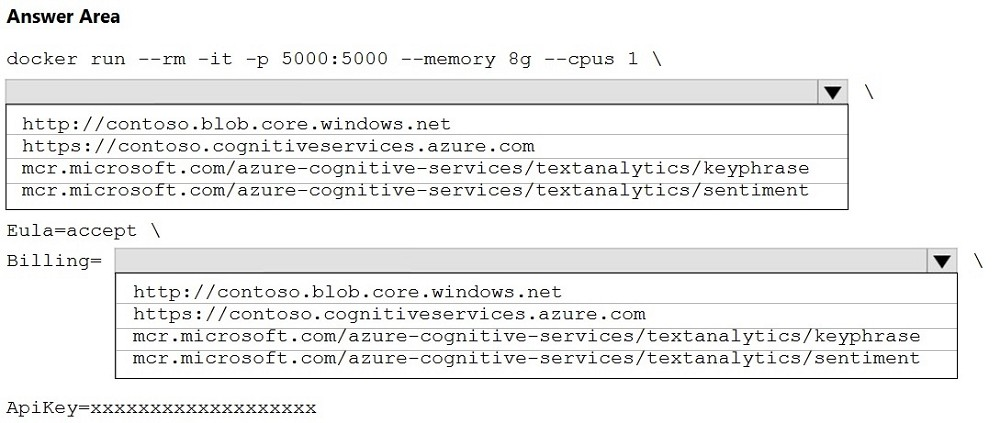
Correct Answer:
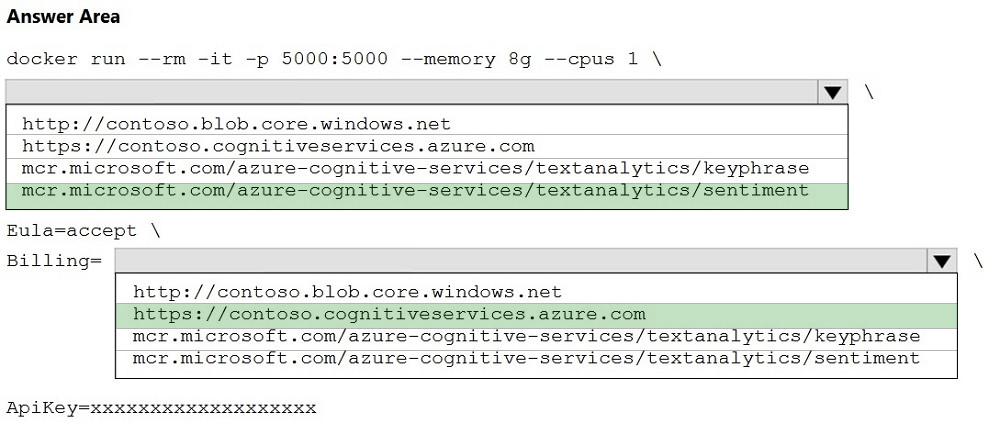
Box 1: mcr.microsoft.com/azure-cognitive-services/textanalytics/sentiment
To run the Sentiment Analysis v3 container, execute the following docker run command. docker run --rm -it -p 5000:5000 --memory 8g --cpus 1 \ mcr.microsoft.com/azure-cognitive-services/textanalytics/sentiment \
Eula=accept \
Billing={ENDPOINT_URI} \
ApiKey={API_KEY} is the endpoint for accessing the Text Analytics API. https://<your-custom-subdomain>.cognitiveservices.azure.com
Box 2: https://contoso.cognitiveservices.azure.com
{ENDPOINT_URI} is the endpoint for accessing the Text Analytics API: https://<your-custom-subdomain>.cognitiveservices.a The endpoint for accessing the Text
Analytics API. zure.com -
Reference:
https://docs.microsoft.com/en-us/azure/cognitive-services/text-analytics/how-tos/text-analytics-how-to-install-containers?tabs=sentiment
You have the following C# method for creating Azure Cognitive Services resources programmatically.
You need to call the method to create a free Azure resource in the West US Azure region. The resource will be used to generate captions of images automatically.
Which code should you use?
Correct Answer:
B
🗳️
Many of the Cognitive Services have a free tier you can use to try the service. To use the free tier, use F0 as the SKU for your resource.
There are two tiers of keys for the Custom Vision service. You can sign up for a F0 (free) or S0 (standard) subscription through the Azure portal.
Incorrect Answers:
A: There is no free tier (F0) for ComputerVision.
Reference:
https://docs.microsoft.com/en-us/azure/cognitive-services/cognitive-services-apis-create-account-client-library?pivots=programming-language-csharp https://docs.microsoft.com/en-us/azure/cognitive-services/custom-vision-service/limits-and-quotas
You successfully run the following HTTP request.
POST https://management.azure.com/subscriptions/18c51a87-3a69-47a8-aedc-a54745f708a1/resourceGroups/RG1/providers/
Microsoft.CognitiveServices/accounts/contoso1/regenerateKey?api-version=2017-04-18
Body{"keyName": "Key2"}
What is the result of the request?
Correct Answer:
B
🗳️
Accounts - Regenerate Key regenerates the specified account key for the specified Cognitive Services account.
Syntax:
POST https://management.azure.com/subscriptions/{subscriptionId}/resourceGroups/{resourceGroupName}/providers/Microsoft.CognitiveServices/accounts/
{accountName}/regenerateKey?api-version=2017-04-18
Reference:
https://docs.microsoft.com/en-us/rest/api/cognitiveservices/accountmanagement/accounts/regeneratekey